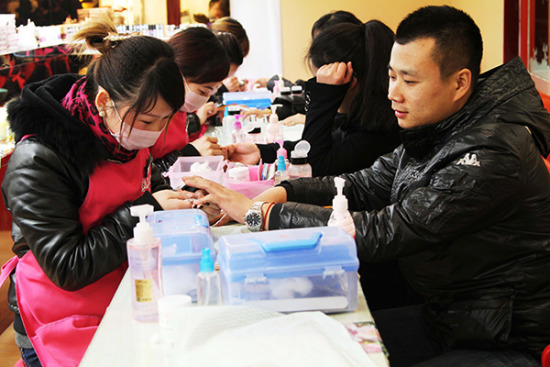
A man gets amanicure at a beauty shop in Xuchang, Henan province. (Photo/China Daily)
Driving the increasing consumption of male cosmetics is the widespread belief in China that looking good plays an important part in succeeding socially and professionally.
Ding Chen, a 30-year-old businessman who spends up to 600 yuan every two months on personal care, particularly on moisturizers, cleansers and cologne, said: "Men spend money on beauty products for improving self-confidence, attracting women and building a better self image. After all, good first impressions can make a big difference."
That is also an opportunity for foreign brands, which currently take 76.6 percent share of the men's grooming market in China, to launch beauty products for appearance-conscious consumers.
Satoshi Hirota, a press representative of Japanese cosmetics manufacturer Shiseido Company Ltd, said: "We anticipate huge growth potential in the male beauty market as more and more men are paying attention to their appearance. This year, sales of Shiseido Men's lotion and emulsion in China rose by more than 10 percent from the levels in 2014".
Sisheido, which developed the Aupres Mens beauty line exclusively for the Chinese market back in 1994, expects the men's skin care market in the country to maintain a growth momentum of over 10 percent in 2016. The company is also using the boom in men's beauty products as an opportunity to boost spending in China.
"We cannot reveal the exact amount but we are planning to invest more for expanding points of contact with consumers," said Hirota.
Germany's Beiersdorf AG sees huge potential in online sales for its Nivea beauty brand in China due to a change in the younger generation's shopping behavior.
Online sales in the men's grooming market in China currently account for 40 percent of total sales, according to US-based information provider Nielsen Holdings NV.
Inken Hollmann-Peters, vice-president of Corporate Communications at Beiersdorf, said: "Unlike five years ago when hypermarket and supermarket channels were still dominant, now more men choose to shop from online or cosmetic stores. We estimate a growth (in the men's grooming market in China) of around 15 percent or more from 2015 to 2020 for both online and offline channels."
United States-based Procter & Gamble Co, manufacturer of Gillette razors and the Olay Mens Solutions skin care brand, agrees that most men are moving from offline to online channels to purchase grooming products.
Erica Li, a press representative at P&G said: "They even use e-commerce search as the first step to gain product knowledge."
Increasing disposable income and the desire for a better lifestyle are some of the factors that are expected to keep driving the industry in the coming years, with men being increasingly adventurous with high-end beauty products that go beyond the most basic needs.
Chen Wenwen, a senior beauty analyst at Mintel, said: "There is still huge potential in the men's grooming market in China as customers move on to pricier categories, particularly eye care, serum, or facial cream products with makeup benefits."


















































